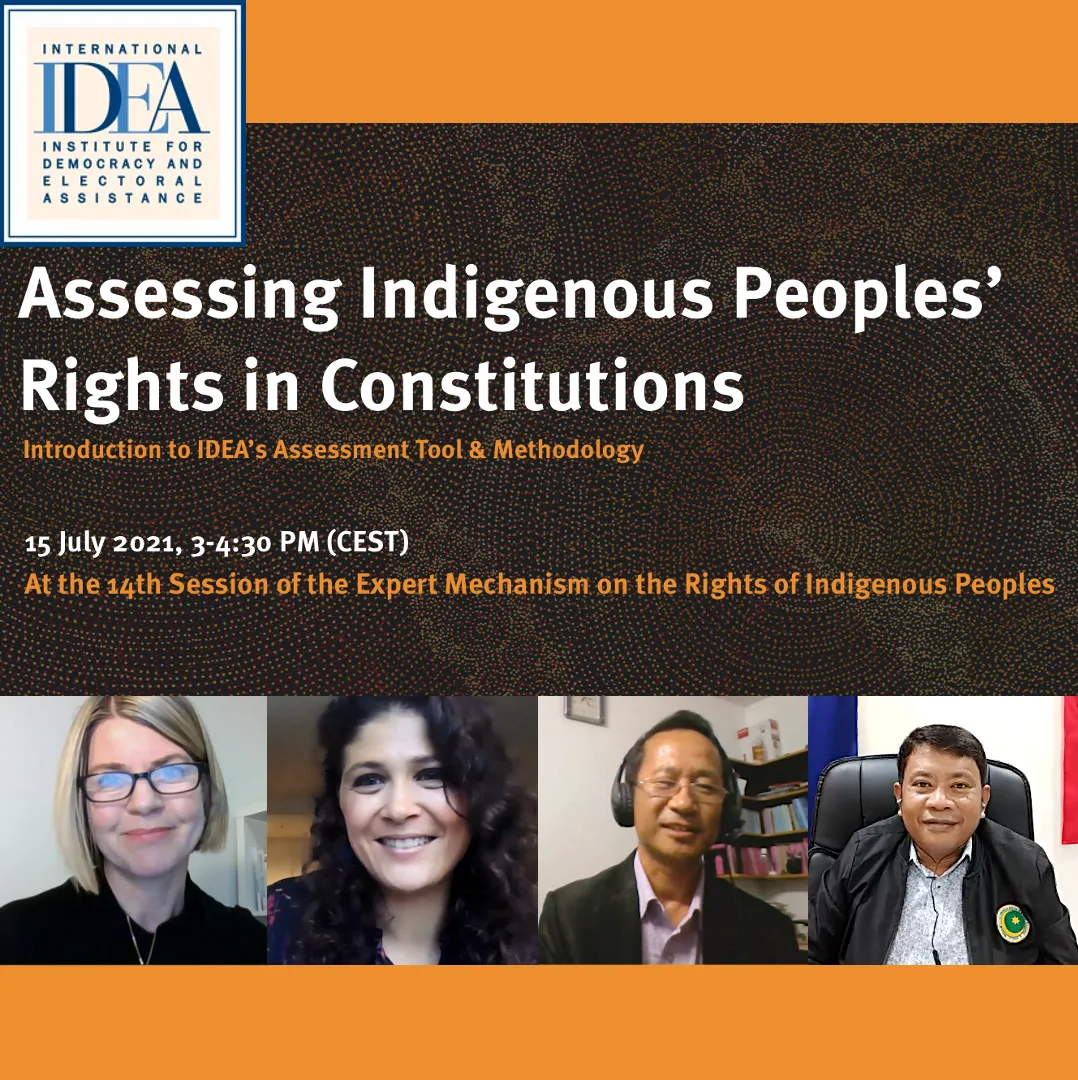Assessing Indigenous Peoples’ Rights in Constitutions

The International Institute for Democracy and Electoral Assistance (International IDEA) hosted a side event on 15 July 2021; ‘Assessing Indigenous Peoples’ Rights in Constitutions’, at the 14th Session of the Expert Mechanisms on the Rights of Indigenous Peoples (EMRIP). The event aimed to introduce key stakeholders including government actors, indigenous peoples and UN agencies to the Indigenous Peoples’ Rights in Constitutions Assessment Tool (IPCAT), with an overview on the Tool’s development and methodology by its author, Amanda Cats-Baril, and commentary on experiences applying the Assessment Tool by Shankar Limbu of the Lawyers’ Association for Human Rights of Nepalese Indigenous Peoples (LAHURNIP) in Nepal and Romeo Saliga of the Bangsamoro Transitional Authority (BTA) in the Philippines.
In the opening, Leena Rikkilä Tamang, Asia & the Pacific Regional Director, explained how IPCAT—developed by International IDEA and launched in 2020—aims to help communities, advocates, civil society actors, constitutional drafters and other concerned individuals analyze a constitution, draft a constitution, or other foundational law from the perspective of indigenous peoples’ rights. The IPCAT’s author, Amanda Cats-Baril (Regional Advisor for Constitution-Building Processes, International IDEA) discussed how global trends in advocacy towards recognizing diversity and indigenous peoples’ autonomy, particularly in Nepal, provided the impetus for the tool’s development. She also discussed how the IPCAT was developed to provide tangible support to communities seeking to implement robust reform.
Ms Cats-Baril canvassed the scope of issues addressed by the IPCAT, the questions asked and the method of completion. Using a series of 34 questions grouped across eight themes, the IPCAT guides the users to analyze constitutional and fundamental legal issues affecting indigenous peoples, including matters of recognition, autonomy, consultation and rights to culture. Ms Cats-Baril emphasized the flexibility of the Assessment Tool, noting that it can be applied either in its entirety or in discrete modules focused on specific issues of increased relevance to a particular group or country. The Assessment Tool uses international standards and comparative examples to enable users to develop evidence-based advocacy agendas, that in turn enhance their ability to effectively participate in constitutional and legal reform.
After the overview of the Assessment Tool, Shankar Limbu, of LAHURNIP, spoke about the pilot conducted in Nepal during the course of the Assessment Tool’s development and Romeo Saliga, from the BTA in the Philippines, discussed how the Assessment Tool was useful for government actors with a mandate to promote and protect indigenous peoples’ rights.
A leading human rights lawyer, Mr Limbu spoke of the utility of the Assessment Tool in the context of promoting and defending indigenous peoples’ rights. Mr Limbu reflected on his experience of the constitution-making process in post-conflict Nepal, where the IPCAT (then in its draft form) enabled pragmatic reform efforts by supporting the targeted and detailed assessment of roughly 300 constitutional provisions. Mr Limbu noted that “the constitutional process directly concerns indigenous peoples everywhere”, making it vital that “ordinary people should have the capacity to be able to understand [and] analyze the constitution”. He commended the IPCAT’s accessibility in this regard, highlighting its use of “demystified language, very simple plain language that the layman can understand.”
Mr Saliga provided an overview of the Assessment Tool’s application from a governmental perspective. He highlighted the Assessment Tool’s effectiveness in enabling users to both systematically analyze existing constitutional deficiencies and identify potential improvements that better support indigenous peoples’ rights. Mr Saliga recognized the “vital” nature of indigenous participation in constitution-making, and commended the Assessment Tool’s capacity to encourage active participation amongst indigenous groups. In Bangsamoro, the IPCAT helped “ensure that indigenous peoples claim ownership over legislative issues”, allowing them to recognize that the resulting constitutional and legislative amendments are “not for the Bangsamoro government, not for anybody else, but [are] for them”.
International IDEA is grateful to both Mr Limbu and Mr Saliga for providing valuable insights on the value of the IPCAT and its application in varying contexts. Thanks also to EMRIP for supporting this event alongside its 14th Session.
International IDEA acknowledges the IPCAT Cover image and artwork: "Ancestors" @Sarrita King, Australia.
International IDEA invites you to review the recording of the event on YouTube, and to access a copy of the IPCAT here. International IDEA looks forward to translating the tool to make it more broadly accessible, and it will soon be available in French, Spanish and Tagalog. We appreciate any thoughts about the IPCAT’s application and further improvements: please contact Amanda Cats-Baril at A.Cats-Baril@idea.int with any questions or for potential collaborations.




